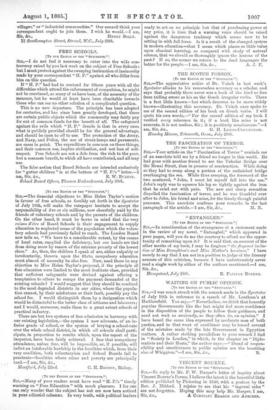FREE SCHOOLS.
[TO THE EDITOR OF THE "SPECTATOR."] SIR,—I do not feel it necessary to enter into the wide con- troversy raised by you last week on the subject of Free Schools; bat I must protest against the sweeping insinuation of insincerity made by your correspondent "H. P." against all who differ from him on this question.
If "H. P." had had to contend for fifteen years with all the difficulties which attend the enforcement of compulsion, he might not be convinced, as many of us have been, of the necessity of the measure, but he would at least have been charitable towards those who can see no other solution of a complicated question.
This is no new departure. The principle has been adopted for centuries, and has since been greatly developed, that there are certain public objects which the community may fairly pay for out of common funds for the benefit of all. The safeguard against the evils which "H. P." dreads is that in every case, what is publicly provided should be for the general advantage, and should be open to all to use. The protection of the Army, and Navy, and Police, the use of street-lamps and pavements, are cases in point. The expenditure in common on these things, and their common use, implies civilisation, and not loss of self- respect. Free Schools are not a dole from the rich to the poor, but a common benefit, to which all have contributed, and all may use.
The false notion that Board Schools are intended exclusively for "gutter children" is at the bottom of "U. P.'s" letter.—I


































 Previous page
Previous page